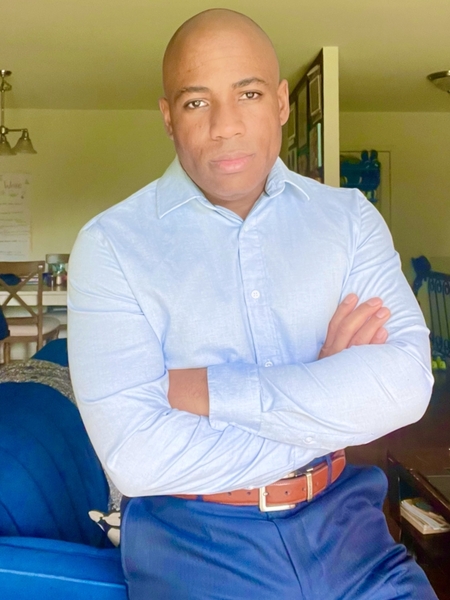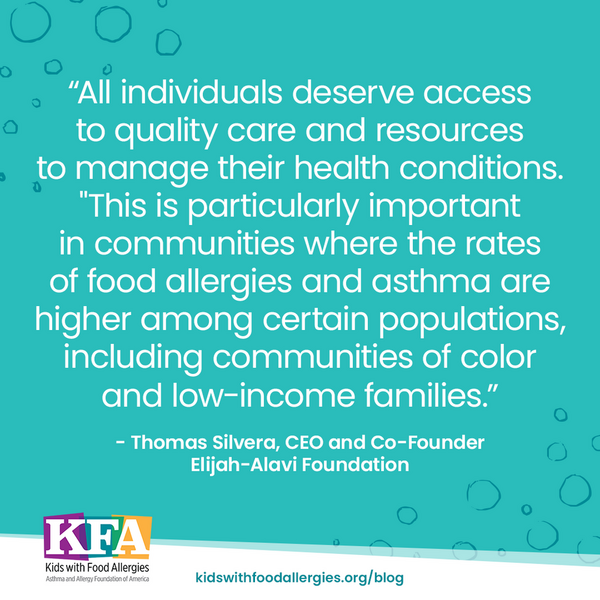Black Americans bear a much higher burden of food allergies than white Americans. Compared to white Americans, Black Americans report more severe food allergy reactions and more emergency room visits for food allergy reactions.1 This is why reducing food allergy disparities is a critical part of the mission of Kids with Food Allergies (KFA). KFA is the food allergy division of the Asthma and Allergy Foundation of America (AAFA).
Despite these statistics, people like Thomas Silvera are making an impact within their local communities. In honor of Black History Month, KFA spoke with Thomas about the important work he does.
About Thomas Silvera, CEO and Co-Founder of the Elijah-Alavi Foundation
 Thomas Silvera is the CEO and Co-Founder of the Elijah-Alavi Foundation. He is a certified surgical technologist and public health advocate with a Master of Science in Public Health and is currently pursuing a doctoral degree.
Thomas Silvera is the CEO and Co-Founder of the Elijah-Alavi Foundation. He is a certified surgical technologist and public health advocate with a Master of Science in Public Health and is currently pursuing a doctoral degree.
Thomas is a tireless advocate for public health regarding food allergies and asthma, particularly in child care and day care centers. He played a crucial role in the passing of Elijah’s Law in New York, which was signed into law on Sept. 12, 2019. This law was named after Thomas’ son, Elijah Silvera, and was a major milestone in the fight for improved health and safety in child care centers across New York. More recently, Thomas played a key role in the passing of Elijah’s Law in Illinois and Virginia.
With the full implementation of Elijah’s Law in New York, the state and the support of Thomas Silvera, New York has allocated $19.5 million for an AUVI-Q auto-injector initiative. Thomas’ ultimate goal is to implement Elijah’s Law in every state and eventually nationally, making a significant impact in the lives of children and families across the country.
Q: What led you to your work advocating for people with food allergies and asthma?
Thomas: My son Elijah passed away due to a severe food allergy reaction at his child care center in New York City. This tragedy led my family and me to become advocates for the food allergy/asthma community, with a focus on raising awareness and training and educating others about the risks and realities of food allergies. I believe that no family should have to experience what we did. With the right information and resources, we can prevent similar tragedies from happening.
Q: Why are you passionate about working to end health disparities?
Thomas: I am passionate about ending health disparities because health is a fundamental right and should not be determined by one's race, ethnicity, or socioeconomic status. All individuals deserve access to quality care and resources to manage their health conditions. This is particularly important in communities where the rates of food allergies and asthma are higher among certain populations, including communities of color and low-income families. I believe that by working to eliminate these disparities, we can ensure that everyone has the support they need to manage their food allergies and asthma safely and effectively by mitigating risk.

Q: What is your favorite part of the work you do with the food allergy community?
Thomas: My favorite aspect of the work I do is seeing the impact that it has on families and individuals who are impacted by food allergies and asthma. Through my advocacy work, I have been able to connect with families who have faced similar challenges and provide them with support and resources. I am also proud to be a part of the implementation of Elijah’s Law in several states such as New York, Illinois, and Virginia (others soon to follow), which aims to improve food allergy awareness and education in schools and communities on a national level. I am also proud of Elijah's Echo Ambassador program, which provides awareness, advocacy, and educational resources for children and families living with food allergies and asthma.
Elijah’s Law Report: Preventing Food Allergy Reactions in Child Care Programs
AAFA and the Elijah-Alavi Foundation worked together to create the “Child Care Policies for Food Allergy: Elijah’s Law Report for the U.S. States and Territories.”
Our report looks at state and U.S. territory child care licensing regulations against nine policy standards. The standards aim to protect children with food allergies in child care settings. The report also includes an advocacy toolkit to help you advocate for Elijah’s Law in your home state.
Learn more about “Child Care Policies for Food Allergy: Elijah’s Law Report for the U.S. States and Territories.
Q: What recommendations do you have for people interested in reducing food allergy and asthma health disparities in their local communities?
Thomas: For those interested in reducing allergy and asthma health disparities in their local communities, I recommend getting involved with advocacy groups and organizations that are focused on these issues. You can also educate yourself on the disparities and challenges faced by communities of color and low-income families and work to raise awareness and support in your own community. Additionally, supporting policies and initiatives that promote equity in health care and access to resources for managing health conditions can also help to reduce disparities.
Q: Is there anything else you’d like to share as you reflect upon Black History Month and your work?
Thomas: As I reflect upon Black History Month, I am reminded of the important role that communities of color have played in shaping the history of our country. I am proud to be a part of the food allergy and asthma community, and I am committed to using my voice to raise awareness and support for those who are impacted by these conditions. Through advocacy, education, and collaboration, I believe that we can work together to create a more equitable and inclusive world for all.
How Can You Help Reduce Food Allergy Disparities?
The only way we can reduce health disparities is if we all work together. Everyone – from people with food allergies to policymakers and the health care industry – can be a part of building programs that make a lasting difference for people, families, and communities impacted by food allergies.
Sign up for KFA’s community to stay up to date about the following opportunities to get involved:
- Advocate for people affected by food allergy disparities
- Participate in patient-centered research and clinical trials
You can also donate to support KFA’s mission to create real and lasting change.
References
1. Warren, C. M., Jiang, J., & Gupta, R. S. (2020). Epidemiology and Burden of Food Allergy. Current allergy and asthma reports, 20(2), 6. https://doi.org/10.1007/s11882-020-0898-7



Comments (0)